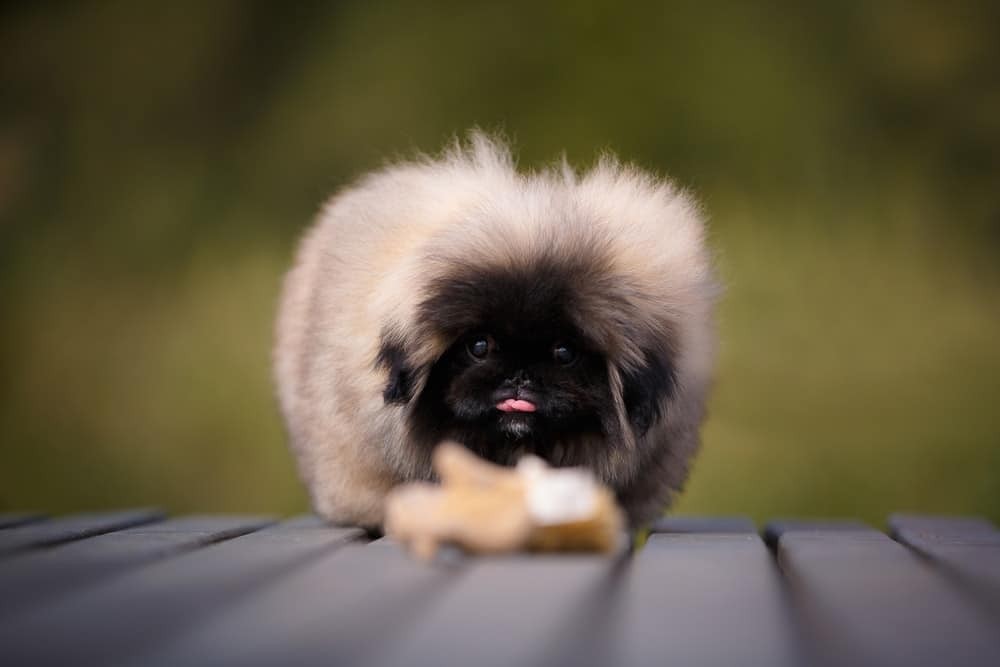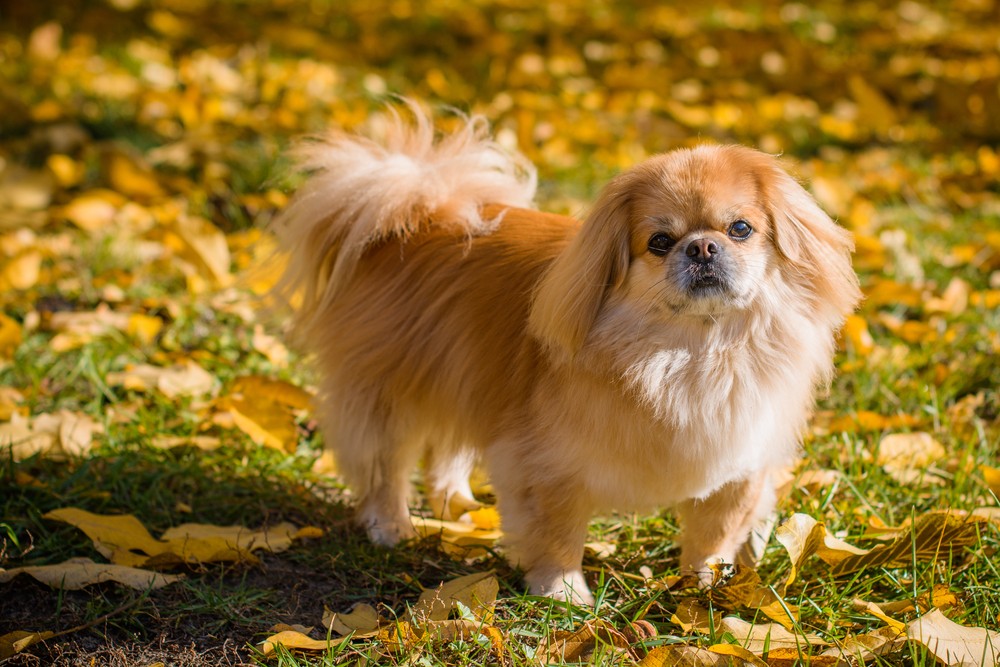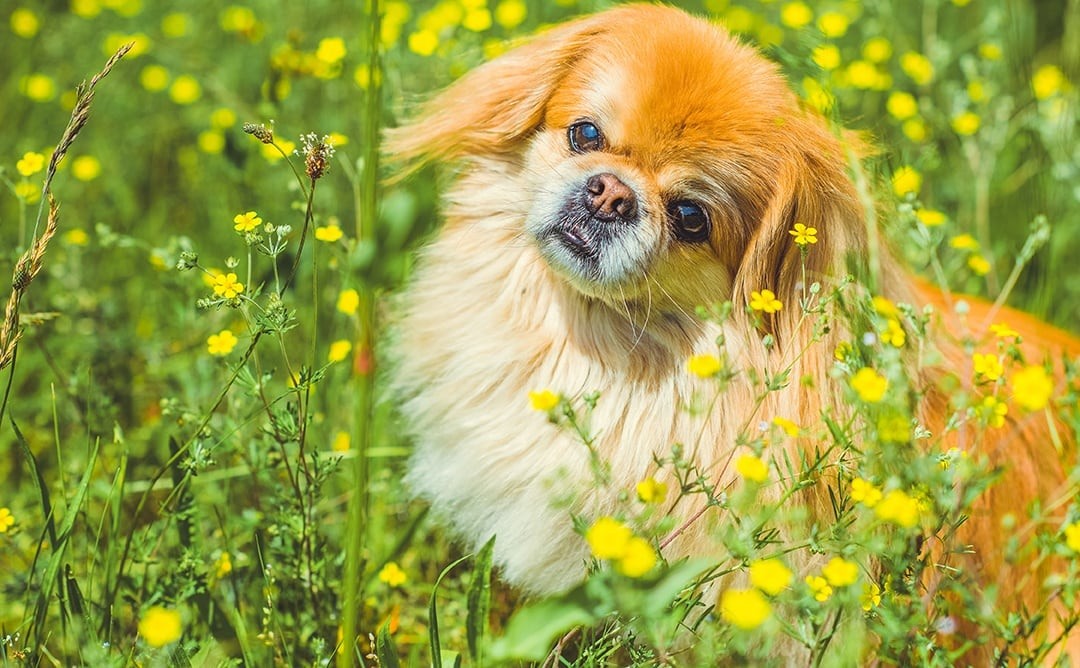The Pekingese, with their regal bearing and lion-like mane, are a dog breed that immediately captures attention. Originating from ancient China and once the cherished companions of royalty, these small dogs have seen a surge in popularity as beloved pets. If you’re considering welcoming a Pekingese into your home, understanding their unique traits is essential. This guide delves into the Pekingese breed, exploring their temperament, care needs, and suitability as a pet, helping you decide if they are the right match for your lifestyle.
Pekingese Breed: At a Glance
| Feature | Description |
|---|---|
| Height | 6–9 inches (15-23 cm) |
| Weight | 8–10 pounds (3.6-4.5 kg) |
| Lifespan | 12–15 years |
| Coat Colors | Biscuit, black, cream, fawn, gray, red, white |
| Best Suited For | Companionable individuals, older families, apartment living |
| Temperament | Affectionate, alert, dignified, loyal, independent |




The Pekingese is an ancient breed hailing from China, steeped in history and once exclusively owned by Chinese royalty. Their distinctive appearance, characterized by a thick mane reminiscent of a lion and a flat, expressive face, is instantly recognizable. Beyond their looks, Pekingese are known for their devoted nature, forming deep bonds with their families. Their compact size makes them adaptable to apartment living and city environments. While not excessively vocal, they possess a keen alertness, making them excellent watchdogs, unafraid to announce any perceived disturbances, regardless of their size.
Understanding Pekingese Characteristics
When considering any dog breed, it’s helpful to evaluate key characteristics that contribute to their overall personality and care requirements. Here’s a breakdown of what to expect with a Pekingese:
Energy Level:
Pekingese are considered low to moderate energy dogs. While they enjoy playtime and short bursts of activity, they are not demanding in terms of exercise. Daily walks are important for their health and well-being, but they are equally content with indoor games and lounging by your side. This makes them well-suited to owners with less active lifestyles or those living in smaller spaces.
Trainability:
Pekingese are intelligent dogs, but they are also known for their independent and sometimes stubborn nature. This can make training a unique experience. They respond best to positive reinforcement techniques, such as treats, praise, and gentle encouragement. Consistency and patience are key. Early socialization and puppy training classes are highly recommended to establish good manners and help them become well-adjusted companions.
Health:
Like all breeds, Pekingese are predisposed to certain health conditions. Understanding these potential issues is crucial for responsible pet ownership. While proper care, nutrition, and regular veterinary check-ups can contribute to a long and healthy life, it’s important to be aware of breed-specific health concerns.
Lifespan:
Pekingese typically enjoy a lifespan of 12 to 15 years, which is a relatively long lifespan for a dog breed. Providing them with a healthy lifestyle, including a balanced diet, regular exercise, and preventive veterinary care, can help maximize their longevity.
Sociability:
Pekingese are deeply devoted to their families but can be reserved with strangers. Early socialization is vital to help them become more comfortable and accepting of new people and situations. While they can learn to get along with other pets, their inherent confidence means they may not always back down in confrontations, so careful introductions and supervision are advisable, especially with larger dogs.
A playful Pekingese puppy exploring its surroundings.
Pekingese Puppies: A Royal Start
Pekingese puppies are undeniably charming, full of playful energy, curiosity, and affection. Bringing a Pekingese puppy home is an exciting time, but it also requires commitment and preparation. Puppy-proofing your home is essential to protect your new pet from hazards and your belongings from curious puppy explorations. Supervision is key, especially during their early months.
Socialization is paramount during puppyhood. Exposing your Pekingese puppy to a variety of sights, sounds, people, and other animals in a positive and controlled manner will help them develop into well-rounded and confident adults. This early socialization period is crucial for shaping their temperament and reducing potential anxieties later in life.
Finding a reputable breeder is important if you decide to purchase a Pekingese puppy. Responsible breeders prioritize the health and well-being of their dogs and adhere to breed standards. While online breeders may seem convenient, it’s crucial to thoroughly vet any breeder and prioritize those who are transparent and prioritize the health of their dogs over profit. Consider also exploring Pekingese rescue organizations, as adoption is a wonderful way to give a deserving dog a loving home.
Temperament and Intelligence: The Pekingese Personality
Pekingese owners often describe their dogs as regal, dignified, and intensely loyal. They possess a certain self-assuredness and can sometimes appear aloof to those outside their inner circle. Often, Pekingese will bond strongly with one primary person in the household, though they are affectionate with the whole family.
Their alert nature and inherent watchfulness make them excellent watchdogs. They are quick to announce visitors or any unusual sounds, demonstrating a protective instinct despite their small size. While they are intelligent dogs, their independent spirit can present challenges during training. They are not always eager to please in the traditional sense and may require extra motivation and consistent, positive training methods. Pekingese tend to respond best when they understand the “why” behind a command, so making training engaging and rewarding is crucial.
Pekingese in Families: Are They a Good Fit?
Pekingese can thrive in family environments, particularly with older children who understand how to interact respectfully with small dogs. Their affectionate and playful nature makes them enjoyable companions. Their adaptability to different living situations, including apartments and smaller homes, is another advantage for families in various settings. Their comical antics and expressive personalities can bring joy and entertainment to a household.
However, their small size makes them vulnerable to accidental injuries, especially from young children who might not be aware of their fragility. Careful supervision and teaching children how to handle a Pekingese gently are essential to ensure the safety of both child and dog.
A Pekingese enjoying a playful moment outdoors.
Pekingese and Other Pets: Can They Coexist?
Pekingese can often live harmoniously with other pets, especially if they are raised together from puppyhood. Their playful and generally friendly disposition can extend to other dogs and even cats. However, their inherent confidence and fearlessness mean they may not back down from a confrontation, even with a much larger animal. Therefore, introductions to other pets should be gradual and supervised, and it’s important to ensure that all pets in the household have adequate space and resources to avoid competition and stress.
Essential Aspects of Pekingese Ownership
Owning a Pekingese is a rewarding experience, but it’s important to be prepared for their specific needs:
Food and Diet: Nourishing Your Pekingese
Providing your Pekingese with a high-quality dog food appropriate for their age and size is crucial for their health and well-being. Look for dog food brands that list real meat (such as chicken, beef, or fish) as the primary ingredient and avoid those with excessive fillers, artificial colors, or preservatives. Consult with your veterinarian to determine the best food and portion sizes for your individual Pekingese, and whether a small breed formula is recommended. Always be mindful of potential food recalls and stay informed about pet food safety.
Exercise Needs: Keeping Your Pekingese Active
While Pekingese are not high-energy dogs, they still require regular exercise to maintain a healthy weight and prevent boredom. Daily walks, even short leisurely strolls, are important. Indoor playtime, incorporating mentally stimulating games and toys, is also beneficial. Due to their brachycephalic (flat-faced) nature, Pekingese can be sensitive to heat and humidity. Avoid strenuous exercise during hot weather and ensure they always have access to fresh water and a cool, shaded environment.
Training Your Pekingese: Patience and Positive Reinforcement
Training a Pekingese requires patience, consistency, and positive reinforcement. Start training early in puppyhood to establish good habits and routines. Keep training sessions short, engaging, and reward-based. Use treats, praise, and affection to motivate your Pekingese. Focus on basic obedience commands, leash manners, and house training. Remember their independent nature and celebrate small victories along the way.
A well-groomed Pekingese with its characteristic luxurious coat.
Grooming Requirements: Maintaining the Royal Coat
The Pekingese boasts a long, luxurious double coat that requires regular grooming to prevent mats and tangles and keep them looking their best. Daily brushing is recommended to remove loose hair and maintain coat health. Occasional bathing with a high-quality dog shampoo is necessary, but avoid over-bathing, which can dry out their skin. Pay special attention to the area around their eyes, as their facial structure can make them prone to tear staining. Regularly check and clean their ears to prevent infections. Dental hygiene is also crucial; brush their teeth several times a week with pet-safe toothpaste to help prevent dental disease.
Pekingese Health Concerns: Awareness and Prevention
While Pekingese are generally healthy dogs, they are predisposed to certain health conditions, including:
Minor Conditions:
- Dental disease: Due to their small mouths and teeth crowding, dental disease is common. Regular dental care is essential.
- Obesity: Their low energy levels and love of food can make them prone to obesity if diet and exercise are not carefully managed.
Serious Conditions:
- Brachycephalic syndrome: Their flat faces can lead to breathing difficulties, especially in hot or humid weather.
- Dry eye syndrome (Keratoconjunctivitis Sicca): Reduced tear production can cause eye irritation and discomfort.
- Mitral valve disease: A heart condition that can affect smaller breeds, including Pekingese.
Regular veterinary check-ups, a healthy lifestyle, and awareness of these potential health issues are crucial for ensuring your Pekingese lives a long and comfortable life.
Male vs. Female Pekingese: Personality Nuances
While individual personalities vary, some general differences are often observed between male and female Pekingese. Males are sometimes described as being more outgoing and overtly affectionate, while females can be more independent and reserved. However, socialization, training, and individual experiences play a significant role in shaping a dog’s personality, regardless of sex.
Fascinating Facts About Pekingese: Royal Lineage
To further appreciate the Pekingese, here are some intriguing facts:
- Royal Heritage: The Pekingese was developed in China specifically for the Imperial family and were considered sacred dogs.
- Titanic Survivor: A Pekingese named Sun Yat-Sen was one of the few dogs to survive the sinking of the Titanic, highlighting their resilience.
- Gifts of Diplomacy: In ancient China, Pekingese were highly prized and often gifted to foreign dignitaries as valuable treasures, signifying their esteemed status.
Final Verdict: Are Pekingese Good Pets?
So, Are Pekingese Good Pets? The answer is a resounding yes, for the right owner. Pekingese make wonderful companions for individuals and families who appreciate their unique personalities and are prepared to meet their specific needs. Their small size, moderate energy levels, and devoted nature make them well-suited to apartment living and those seeking a loyal and affectionate companion.
While they can be independent and require patient training, their intelligence and charm shine through. Their grooming needs are significant due to their luxurious coats, and potential health concerns should be considered. However, for those who are willing to embrace the Pekingese’s royal demeanor and provide them with the love, care, and attention they deserve, they offer a truly rewarding and enriching pet ownership experience. If you are looking for a small dog with a big personality and a rich history, the Pekingese might be the perfect regal companion for you.
Sources:
- AKC Pekingese Breed Information
- Dogster Breed Library – Pekingese
- PetMD Pekingese Breed Profile

